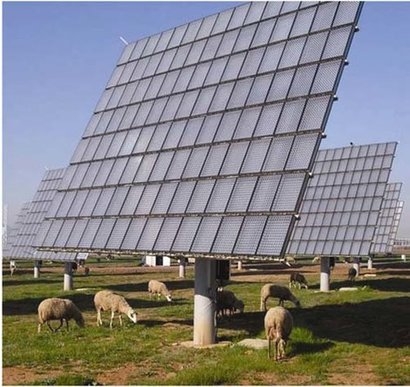
The report notes that installations were also down about 21 percent year-over-year compared to the 2,025 MW installed in Q2 2017. In Q2 2018, large-scale installations totalled 1,184 MW compared to 2,954 MW in Q1 2018 and 1,800 MW in Q2 2017.
Rooftop installations accounted for 415 MW, up 6 percent compared to the 390 MW installed the previous quarter and up 84 percent compared to 225 MW installed in Q2 2017, according to the report. In Q2 2018, large-scale solar projects accounted for 74 percent and rooftop solar accounted for the other 26 percent.
Cumulative solar installed capacity totaled 24.6 GW at the end of Q2 2018 with large-scale solar projects accounting for 90 percent and rooftop solar making up the remaining 10 percent.
The large-scale solar project pipeline for India stands at 11.2 GW. Projects totaling 18.6 GW have been tendered and were pending auction at the end of Q2 2018 the report notes.
“The drop in solar installations in Q2 2018 after four consecutive quarters of growth was expected and can be attributed to uncertainties around trade cases, module price fluctuations, and PPA renegotiations after record low bids, which contributed to a slowdown in tenders and auctions in 2017” said Raj Prabhu, CEO and Co-Founder of Mercom Capital Group. “All of this resulted in a weaker project pipeline for 2018”.
Mercom India Research is forecasting solar installations of approximately 8.3 GW in calendar year (CY) 2018 with some upside if Q4 commissionings stay on schedule. The drop in installations is mostly from large-scale projects due to the lack of a strong project pipeline. Tender activity cratered after the lowest tariffs were reached in the Bhadla auction in May of 2017 as government agencies started expecting other bids to go down to the 2.44 rupees (~$0.03499)/kWh level that was reached in the Bhadla auction.
Chinese module average selling prices (ASPs) fell by approximately 5 percent quarter-over-quarter (QoQ) to $0.33 (~ rupees 22.58)/W in Q2 2018 from $0.346 (~ rupees 23.68)/W in Q1 2018. Indian module prices meanwhile have declined by about 9 percent QoQ.
Along with the drop in module ASPs, project costs also declined QoQ. According Mercom India Research estimates, large-scale project costs have dropped below 4 crore (~$572,473)/MW for the first time. Project costs are approximately 10 percent cheaper if they are in a solar park. As higher efficiency Mono PERC modules gain traction, the land requirement has also reduced adding to cost savings. Rooftop project costs declined QoQ also due to cheaper modules and balance of systems (BoS).
Mercom India Research predicts solar installations in 2019 to be flat, largely due to lack of auctions and the new guidelines by MNRE which allows for 24 months to commission a project of 250 MW and above and 21 months to commission a project of 250 MW or below. Over 1 GW of large-scale projects will have their commissioning dates moved from 2019 to 2020.
“Due to uncertainty around the safeguard duty, auction activity in the first half of 2018 was weak, which will result in a smaller large-scale project pipeline for 2019. We expect the market to freeze for 3-6 months following the safeguard duty announcement” said Prabhu.
Rooftop installations have been growing robustly so far but are expected to slow down until module prices decrease after the safeguard duty impact wears off. Rooftop is extremely cost sensitive and an increase in project costs will slow down the installations. However, the market is expected to start growing again once module prices decline and negate the safeguard duty impact.
For additional information:

